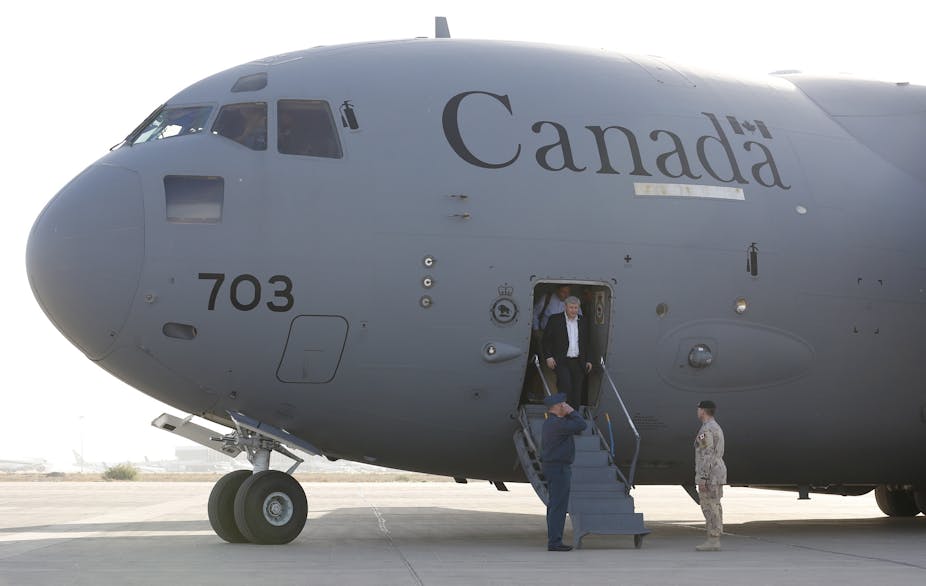For many years, Canada was a model nation when it came to international human rights. It has played a leadership role in the international community seeking to improve international governance, instigated crucial treaties, created peaceful resolution of disputes, and generally stood up for human rights.
This sterling record has long been a core part of Canadian national identity – but today, that identity seems to be in peril.
Not only has Canada not yet signed the humanitarian Arms Trade Treaty, it has recently brokered a $15 billion deal with Saudi Arabia, one of the world’s most noted human rights violators.
This deal marks a tragic fall from grace. In 1996, Canada hosted a conference that launched the Ottawa Process and ended with then foreign minister, Lloyd Axworthy, challenging nations to negotiate a treaty to ban antipersonnel landmines. In December 1997, the Mine Ban Treaty was signed. The norm is not yet universal, though mine–affected countries that have fully implemented the treaty have reduced the number of new victims affected by landmines by two thirds.
In 2001, the Canadian government created the International Commission on Intervention and State Sovereignty, which published the report on the Responsibility to Protect. This report encouraged sovereign states to have a responsibility to protect their own citizens from avoidable mass murder and starvation. If the state is unwilling or unable to do so, then the international community must act.
Since its release, the report has been reaffirmed by the UN, and it’s helped break the cycle of violence in Kenya, Ivory Coast, Libya and the Central African Republic.
Canada is not honouring this sterling record today. And there’s no better example than the Harper government’s contract to sell armoured fighting vehicles to Saudi Arabia, who the 2015 Freedom in the World report called one of the “worst of the worst” human rights violators.
Even though Saudi Arabia is well known for its mistreatment of women, the imprisonment of political dissidents and human rights activists and its enthusiastic use of torture, the Canadian state has made this deal without flinching.
Lagging behind
To make matters worse, there are safeguards in place meant to stop this from happening. Canada’s strict export control policy calls for a thorough human rights assessment before deals like this are done. These assessments are the reason why the Canadian government has claimed that they don’t need to sign the Arms Trade Treaty, which requires such assessments.
But according to Project Ploughshares, a Canadian NGO that aims to prevent war and armed violence, the Department of Foreign Affairs Trade and Development has not produced a Saudi Arabian report in the past two years.
The international community is surprised that this longtime champion of human rights has not signed the Arms Trade Treaty, and even more surprised at the deal with Saudi Arabia. The deal makes Canada the principal contractor to deliver light armoured vehicles to Riyadh. Both of these episodes have happened under the Conservative Party government.

With federal elections taking place on October 19 Stephen Harper has been confronted about the Saudi Arabian deal recently. He has defended it by saying that “notwithstanding its human rights violations, which are significant … is (Saudi Arabia) an ally in the fight against the Islamic State,” and that cancelling the deal would destroy 3,000 factory jobs in the London, Ontario area.
When challenged about Saudi Arabia’s human rights record, he responded with the following:
Look, we express our outrage, our disagreement from time to time with the government of Saudi Arabia for their treatment of human rights. I don’t think it makes any sense to pull a contract in a way that would only punish Canadian workers instead of actually expressing our outrage against some of these things in Saudi Arabia.
Out in the cold
The Canadian government, like its American counterpart, claims to be concerned for what the treaty would do to civilian gun owners, even if the Arms Trade Treaty would not affect its gun-owning population. Since September 2013, the EU has called on Canada to sign the treaty. Even the US, a serial international treaty holdout, has signed up – but Canada is staying out, alongside countries like North Korea, Iran, and of course, Saudi Arabia.
Thomas Muclair, leader of the New Democratic Party, and Justin Trudeau, leader of the Liberal Party, have called on the Harper government to sign the treaty. Trudeau has promised to sign it if elected.
To him, the Conservative government’s actions have badly damaged Canada’s global standing. Depending on the outcome of the 2015 election, there may yet be a chance to turn the tide.

